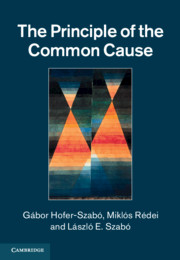Book contents
- Frontmatter
- Contents
- Preface
- 1 Introduction and overview
- 2 The Common Cause Principle
- 3 Common cause extendability of probability spaces
- 4 Causally closed probability theories
- 5 Common common causes
- 6 Common cause extendability of nonclassical probability spaces
- 7 Reichenbachian common cause systems
- 8 Causal closedness of quantum field theory
- 9 Reichenbach's Common Cause Principle and EPR correlations
- 10 Where do we stand?
- Appendix
- References
- Index
4 - Causally closed probability theories
Published online by Cambridge University Press: 05 June 2013
- Frontmatter
- Contents
- Preface
- 1 Introduction and overview
- 2 The Common Cause Principle
- 3 Common cause extendability of probability spaces
- 4 Causally closed probability theories
- 5 Common common causes
- 6 Common cause extendability of nonclassical probability spaces
- 7 Reichenbachian common cause systems
- 8 Causal closedness of quantum field theory
- 9 Reichenbach's Common Cause Principle and EPR correlations
- 10 Where do we stand?
- Appendix
- References
- Index
Summary
Causal closedness and common cause closedness
Assuming that Reichenbach's Common Cause Principle is valid, one is led to the question of whether our probabilistic theories predicting probabilistic correlations can be causally rich enough to also contain the causes of all the correlations they predict. The aim of this chapter is to formulate precisely and investigate this question.
According to the Common Cause Principle, causal richness of a theory T would manifest in T's being causally closed (complete) in the sense of being capable of explaining the correlations by containing a common cause of every correlation between causally independent events A, B. This feature of a theory is formulated in the next two definitions of causal closedness. In both definitions (X, S, p)is a probability space and Rind is a two-place causal independence relation that is assumed to have been defined between elements of S. We treat the relation Rind as a variable in the problem of causal closedness; hence, at this point we leave open what properties Rind should have to be acceptable as a causal independence relation – later we will return to the issue of how to specify it.
Definition 4.1 The probability space (X, S, p) is called causally closed with respect to Rind, if for every correlation Corrp(A, B) > 0 with A ϵ S and B ϵ S such that Rind (A, B) holds, there exists a common cause C of some type in S.
- Type
- Chapter
- Information
- The Principle of the Common Cause , pp. 29 - 50Publisher: Cambridge University PressPrint publication year: 2013

